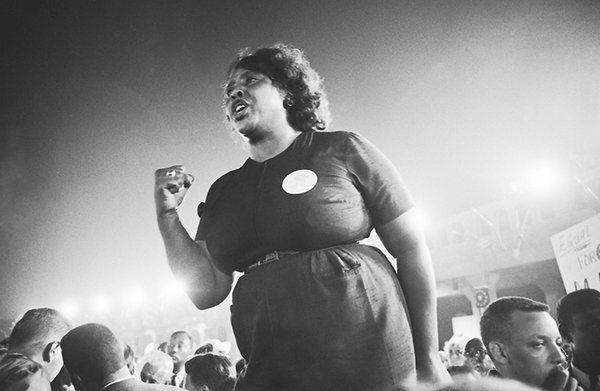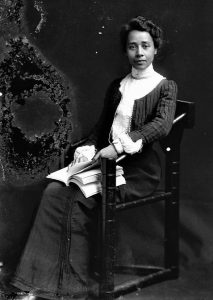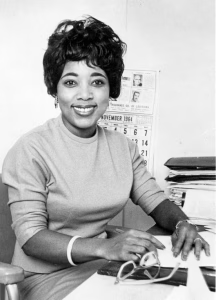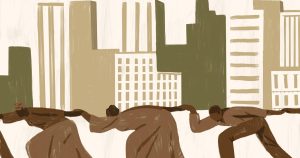Fannie Lou Hamer, October 6, 1917 – March 14, 1977
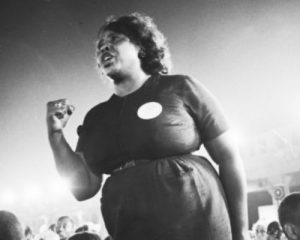 When Tennessee approved the 19th Amendment on August 18, 1920, it was the culmination of the long march to women’s suffrage. Full citizenship and voting rights would become exclusive for some and doggedly elusive for others. The same year of the 19th ratification, a Black girl toddler in rural Mississippi, destined to back-breaking toil, poverty, and second-class citizenship, had little to celebrate. Like uncounted women who would precede and follow, hers was the unfinished business of Black women’s suffrage and citizenship.
When Tennessee approved the 19th Amendment on August 18, 1920, it was the culmination of the long march to women’s suffrage. Full citizenship and voting rights would become exclusive for some and doggedly elusive for others. The same year of the 19th ratification, a Black girl toddler in rural Mississippi, destined to back-breaking toil, poverty, and second-class citizenship, had little to celebrate. Like uncounted women who would precede and follow, hers was the unfinished business of Black women’s suffrage and citizenship.
Fannie Lou Hamer was both extraordinary and everywoman.
The quest for citizenship was unsung and heroic fused, by intersectional advocacy for health, housing, education and economic empowerment. By the time she was six, Fannie Lou – the youngest of 20 children – would join her family in plantation work. Though stricken with polio, the youngster could bail up to 300 pounds of cotton a day.
Fannie Lou embodies what suffrage meant for Black women in the 20th Century. Like everywoman, she knew that making do with what she had was not enough. And as the activist extraordinaire, she would frontally take on the oppressive system; stared down peril, shot at, beaten, jailed, threatened and told by a White supremacist, “…We’ll make you wish you were dead.”
Prolific as an organizer and visionary, Fannie Lou was a consummate collaborator across race and gender divides. The paths she forged were the stuff of civil rights activism and 20th Century suffrage.
She launched Mississippi Freedom Summer with the Student Nonviolent Coordinating Committee and joined a coalition of White women to form the National Women’s Political Caucus. With the National Council of Negro Women, she also launched the Pig Project providing protein to impoverished sharecroppers, and to institutionalize rural self-sufficiency she started the Freedom Farm Cooperative.
As the Democratic Party convenes the national convention this week, the imprint of Fannie Lou Hamer is indelible. In 1964 she led the Mississippi Democratic Freedom Party delegation that demanded to be seated as delegates. They tested democracy at the same time they exposed the hypocrisy of the party power brokers – both southern segregationists and northern patriarchs. That same year she launched a campaign for her state’s open U.S. senate seat, five years before Shirley Chisholm’s successful run in the House.
Her activism was unrelenting. And so were the maladies that sent her to an early grave at 59. During a surgery for removal of a uterine tumor in 1961, she was “treated” to an unauthorized hysterectomy. This widely practiced forced sterilization of Black and Native American women was labeled by Fannie Lou as a “Mississippi appendectomy.”
In 1963, she endured a brutal physical and sexual assault by Mississippi police, reportedly beaten so badly that her eyes were swollen shut. Hamer suffered long-term illness and trauma including a blood clot in her left eye, kidney damage and other injuries that never healed.
In the 1970s, faltering health and conditions described as “nervous exhaustion” slowed her activism. She died on March 14, 1977, reportedly suffering from breast cancer and hypertension. The trail she blazed for full citizenship would be followed by successive generations of Black women into this century.
WISE WOMAN’S WORDS
Fannie Lou Hamer was a self-educated woman forced to trade sharecropping duties in the field over a seat in the school house. She commanded a powerful homespun oratory, blending the cadence of ‘old time’ religion with mother wit assurance. In the spirit of Fannie Lou, we mark the Centennial of the 19th Amendment with resonating words from one of our nation’s most exquisite 20th Century Suffragists.
– Words she confided are inscribed on her tombstone: “All my life I’ve been sick and tired. Now I’m sick and tired of being sick and tired.”
– The first time Fannie Lou was turned away from the courthouse, denied ability to register, the plantation boss man scolded that she did not have his permission to register and that Mississippi was not ready for that. Fannie Lou, who was summarily fired, answered: “I wasn’t trying to register for you…I was registering for myself.”
– Embracing the importance of aligning with White women to build voting power, she stated: “A white mother is no different from a black mother. The only thing is they haven’t had as many problems. But we cry the same tears.”
– To the constant threats of Klan and police assaults, she said: “I guess if I’d had any sense, I’d have been a little scared—but what was the point of being scared? The only thing they could do was kill me, and it kinda seemed like they’d been trying to do that a little bit at a time since I could remember.”
– To The Democratic Party’s 1964 Convention in Atlantic City, she spoke on behalf of the Mississippi Democratic Freedom Party, demanding to be seated as state delegates: “All of this is on account we want to register, to become first-class citizens, and if the Freedom Democratic Party is not seated now, I question America. Is this America, the land of the free and the home of the brave, where we have to sleep with our telephones off the hooks because our lives are threatened daily because we want to live as decent human beings in America?”
Fannie Lou Hamer’s Congressional testimony was so powerful that President Johnson called an impromptu press conference to get her off the air. But his plan backfired.

